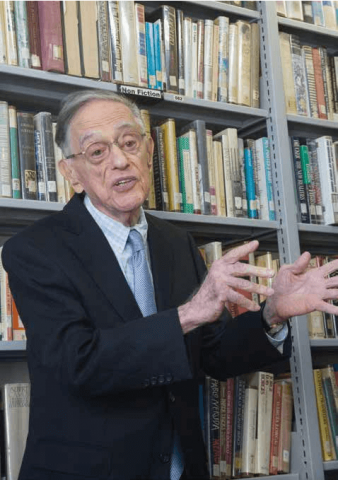Issue:
The eminent professor and author stopped by the Club to discuss his new book.
An evening with Donald Keene

by SUVENDRINI KAKUCHI
THE CLUB WAS GRACED last month by one of Japan’s finest men of letters when Donald Keene stopped by for a Book Break hosted by the library. There he presented his latest book, The First Modern Japanese: The Life of Ishikawa Takuboku, about one of the country’s most beloved poets of the early 20th century.
The 94 year old shared with attendees the beauty of Takuboku’s tanka poetry, while using his research to illustrate a poet that emerged as a sensitive individual documenting interesting times. The honest views of Takuboku, an atheist despite belonging to the family of a Buddhist priest, that are expressed in his poetry and diaries are greatly admired in reticent Japanese society.
“Takuboku’s poetry reveals that he belonged to a world that was unlike that of other tanka poets,” said Keene. “Rather than the beauty of flowers, he wrote on subjects such as emptiness and death. Composing in truth was more important to him than beauty.”
Keene explained how Takuboku kept diaries in Roman letters that recorded his love for his wife despite his numerous affairs, his deepening sensitivity to his environment as he grappled with tuberculosis, and his frustrations with the changes in a 20th century Japan that was ambitiously on the road to becoming a world power. He covered Takuboku’s despair and his individuality: one revelation was that Takuboku continued to refer to Russia as a world power that was superior to Japan despite its defeat by the Japanese military a brave opinion during a time when the Meiji government was celebrating the victory as a landmark in Japan’s march into modernity. Takuboku’s storied career, however, was a short one, Keene explained. The poet died at the age of 26.
It was an evening of fascinating story telling and treasured insights, the results of Keene’s undying love for Japanese literature. He has an equal affection for the country, having recently become a Japanese citizen a decision taken to show solidarity soon after the March 11, 2011 major earthquake and tsunami that devastated the northern coasts and shook the national confidence of Japan.
Keene first arrived in Japan as a translator with the American GHQ and was based in Okinawa, where he collected the testimony of Japanese soldiers. In subsequent writing and interviews, Dr. Keene recalls how that work awakened him to the poignancy of a fallen nation captured young soldiers talked of the brutality of war and their longing for peace. Listening to their tortured accounts opened his eyes to the reality of war, and he remains a staunch pacifist to this day, often using his clout to speak up for the pacifist Constitution.
After retiring from teaching at Columbia University for six decades, Keene now lives in Komagome with his adopted son, a well known shamisen artist. He is a cultural treasure and a bridge between Japan and the U.S., with his views widely sought by academics and experts in both countries.
Suvendrini Kakuchi is the Tokyo correspondent for University World News.

